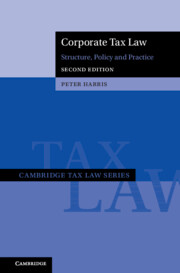Book contents
- Corporate Tax Law
- Cambridge Tax Law Series
- Corporate Tax Law
- Copyright page
- Contents
- Preface
- Abbreviations
- Introduction
- 1 Taxation of Corporate Income When Derived
- 2 Taxation of Corporate Income When Distributed
- 3 Taxation of Corporate Income
- 4 Creating Share Interests
- 5 Transferring Share Interests
- 6 Terminating Share Interests
- 7 Varying Share Interests
- 8 Dividend and Capital Stripping and Value Shifting
- References
3 - Taxation of Corporate Income
International Aspects
Published online by Cambridge University Press: 29 February 2024
- Corporate Tax Law
- Cambridge Tax Law Series
- Corporate Tax Law
- Copyright page
- Contents
- Preface
- Abbreviations
- Introduction
- 1 Taxation of Corporate Income When Derived
- 2 Taxation of Corporate Income When Distributed
- 3 Taxation of Corporate Income
- 4 Creating Share Interests
- 5 Transferring Share Interests
- 6 Terminating Share Interests
- 7 Varying Share Interests
- 8 Dividend and Capital Stripping and Value Shifting
- References
Summary
This chapter projects Chapters 1 and 2 into an international setting by considering how the corporate tax system behaves when international factors are introduced. It continues to presume the capital structure of the corporation does not change. The focus is on the differing jurisdictions to tax resident versus non-resident corporations, and the chapter is structured around this distinction. Three cross-border options where there is a jurisdiction to tax are identified for each of resident and non-resident corporations. The relationships between these options are considered with a particular emphasis on how the tax outcome differs from a purely domestic setting. With respect to resident corporations, it is noted that corporate-level dividend relief does not work well when foreign income is derived, but shareholder-level systems do. By contrast, shareholder-level dividend relief systems do not work well in the context of outbound dividends, but corporate-level dividend relief systems can (but are restricted by recent international norms). Corporate-level dividend relief does not work at all with respect to non-resident corporations. Here many countries’ corporate tax systems distort the choice of whether a non-resident should create a presence through a branch or subsidiary.
Keywords
- Type
- Chapter
- Information
- Corporate Tax LawStructure, Policy and Practice, pp. 354 - 416Publisher: Cambridge University PressPrint publication year: 2024

